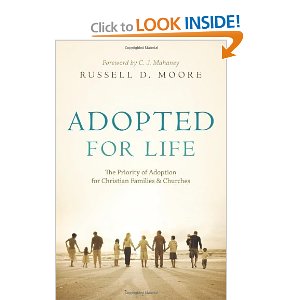“Adopted For Life” – Best Book of 2011
 Adopted for Life is hands down one of the best books I’ve read in a long time. The spiritual and theological connection that author Russell Moore makes with the physical and earthly act of adoption is nothing short of brilliant. Though Moore is a scholar in his own right, he writes with such passion and conviction and out of his own personal adoptive experience that there is absolutely no sense of an “ivory tower” attitude in this book. In fact, the opposite is true. Throughout the book, he recounts much of the process that he and his wife went through to adopt two sons from Russia. The account will make a grown man cry (ahem, … not that I would know).
Adopted for Life is hands down one of the best books I’ve read in a long time. The spiritual and theological connection that author Russell Moore makes with the physical and earthly act of adoption is nothing short of brilliant. Though Moore is a scholar in his own right, he writes with such passion and conviction and out of his own personal adoptive experience that there is absolutely no sense of an “ivory tower” attitude in this book. In fact, the opposite is true. Throughout the book, he recounts much of the process that he and his wife went through to adopt two sons from Russia. The account will make a grown man cry (ahem, … not that I would know).
Moore deals with some of the practical aspects of adoption that every adoptive parent should consider. But he also writes from a theological perspective that will make you stand in awe anew at the glorious adoptive work of our Savior to bring you and me into His kingdom family.
This was definitely a read that I’ll come back to over and over as Tasha and I navigate the tricky but exciting waters of being adoptive parents. I highly recommend it. Here are just a few highlights:
- “Some people would think we’ve done something wrong by renaming these boys. One book for adoptive parents advises against it because it can ‘interfere with the continuity of the child’s life’ or ‘interfere with their sense of self.’ We didn’t agree.We see naming as part of a welcome--the American names represent the fact that the children are now part of an American family.” pp.39-40
- “In the world of the Bible a name said something about who you are, or at least who your parents expected you to become…God names the things as though they are and then makes them that way (Rom. 4:17). The same thing has happened with us in our adoption.” pp. 40-41
- “Churches that mimic (even if by default, with silence) the culture’s view that life is about possessions or sentimental pop-music romance or self-advancement simply aren’t going to produce men and women committed to giving up these things for the cause of global evangelism and missions.” p. 77
- “The numbness to earthly adoption is easily translated to numbness to spiritual adoption. But if people in our churches learn not to grumble at the blessing of minivans filled with children–some of whom don’t look anything alike–they’re going to learn not to grumble at the blessing of a congregation filling with new people, some of whom don’t look anything alike.” p. 77
- “While you’re waiting (for your adoption to be complete), spend time cultivating the spiritual disciplines you’ll need as parents.” p. 142
- “I’ve seen family members of every race and every region of the country turn up their noses at the idea of a niece, nephew, or grandchild of another ethnicity….What I’m surprised by is how many of these extended family members are deacons or women’s ministry directors or ushes or Sunday School teachers in their churches. They’re blissfully unaware, it seems, that what’s resting on them is the spirit of the antichrist. They seem not to comprehend that their own devotion to their flesh would disqualify non-Semitic folks like them from the promises of God. If Jesus agreed with them on adoption and race, they’d be in hell.” p. 156